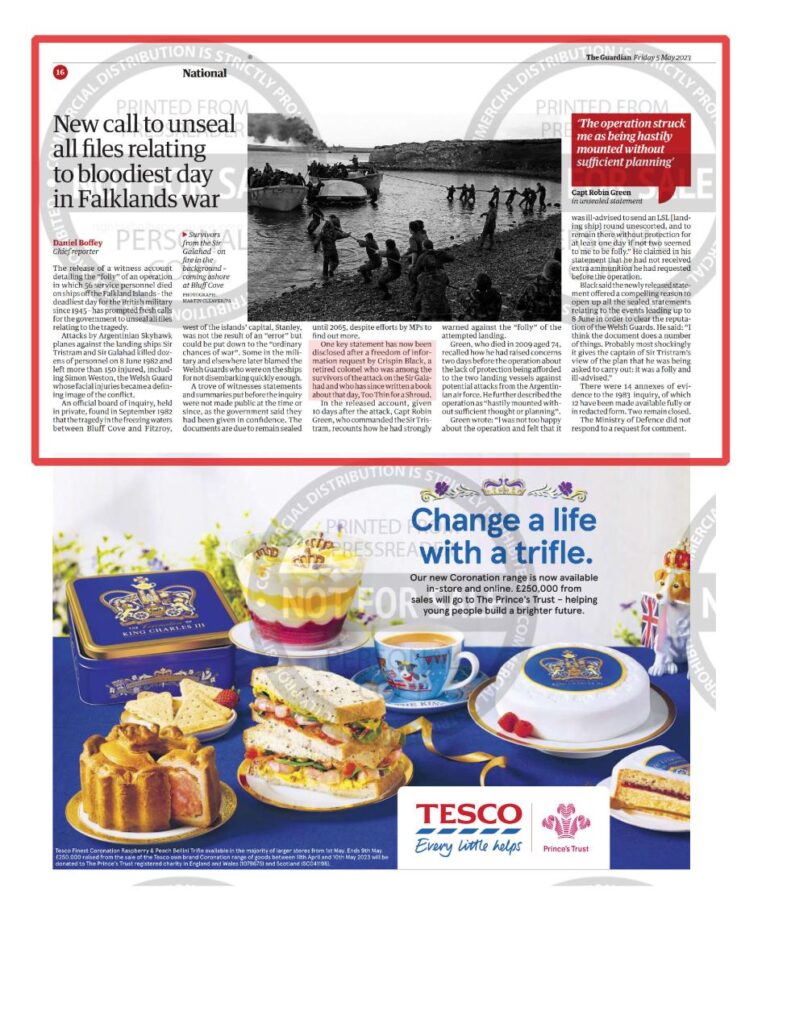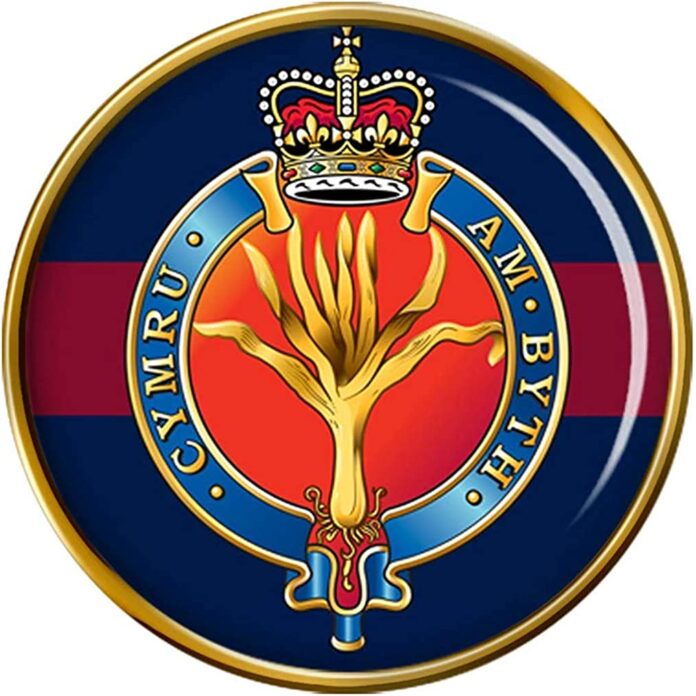- 38 Welsh Guards died on 8 June 1982, Falklands (of 56 in total that day and), the highest day loss in the Falklands
- The Welsh Guards are Charles III former Regiment (as Prince Wales) and taking on an important role in the coronation ceremony
- The official MoD Inquiry of that day is the only Falklands file that has not been declassified: 7 out of 12 files remain secret.
- 8 June 1982 in the Falklands was the day before the attack on Port Stanley was due to start and also Britain’s worst single day of combat since WWII not just during the Falklands War
- Too Thin for a Shroud is the first history of 8 June 1982
- Further to an FOI request, startling new evidence has come to light that suggests gross negligence is the reason why the files remain secret
- MPs Angela Eagle and Chris Bryant’s pressure to get the files opened is being resisted
- The MoD declined to respond
UK ministers urged to unseal files on Falklands attack that killed 56
Calls follow release of account by captain who said he strongly warned against ‘folly’ of attempted landing in June 1982
Daniel Boffey Chief reporter
Fri 5 May 2023 06.00 BST
The release of a witness account detailing the “folly” of an operation in which 56 service personnel died on ships off the Falkland islands – the deadliest day for the British military since 1945 – has prompted fresh calls for the government to unseal all files relating to the tragedy.
Attacks by Argentinian Skyhawk planes against the landing ships Sir Tristram and Sir Galahad killed dozens of service personnel on 8 June 1982 and left more than 150 injured, including Simon Weston, the Welsh guard whose disfigured face became a defining image of the conflict.
An official board of inquiry, held in private, found in September 1982 that the tragedy in the freezing waters between Bluff Cove and Fitzroy, west of the capital, Stanley, was not due to “error” but could be put down to the “ordinary chances of war”. Some in the military and elsewhere later blamed the Welsh guards who were on the ships for not disembarking quickly enough.
A trove of witnesses statements and summaries put before the inquiry were not made public at the time, nor since, as the government said they had been given in confidence. The documents are due to remain sealed until 2065 despite efforts since by MPs on behalf of the survivors to find out more.
One key statement has now been disclosed after a freedom of information request by Crispin Black, a retired colonel who was among the survivors of the attacks on Sir Galahad and who his since written a book about the events of the day, Too Thin for a Shroud.
In the released account, given 10 days after the attack, Capt Robin Green, who commanded Sir Tristram, recounts in a six-page statement how he had strongly warned against the “folly” of the attempted landing of men via his ship and Sir Galahad.
Green, who died in 2009 aged 74, recalled in his statement how he had raised concerns two days before the ill-fated operation about the lack of protection being afforded to the two landing vessels against potential attacks from the Argentinian air force.
He further described the operation as “hastily mounted without sufficient thought or planning”.
Green wrote: “I was not too happy about the operation and felt that it was ill-advised to send an LSL [landing ship logistics class ship] round unescorted, and to remain there without protection for at least one day if not two seemed to me to be folly … The whole operation struck me as being hastily mounted without sufficient thought or planning.”
He claimed in his statement that he did not receive the extra air raid ammunition requested before the operation. “I also said I wanted 20 more Blowpipe AA missiles and these were promised but never arrived,” he said. Green recounted how the weather that day was “fine and clear and we were fully exposed for enemy air attack”.
Black, who was 22 at the time of the disaster, said the newly released statement offered a compelling reason to open up all the sealed statements relating to the events leading up to 8 June in order to clear the name of the Welsh guards.
He said: “I think the document does a number of things. Probably most shockingly it gives the captain of Sir Tristram’s view of the plan that he was being asked to carry out: it was a folly and ill-advised.
“He also makes clear there was no air defence and he obviously feels very aggrieved about that. The other thing that it makes absolutely clear is that his order changes a number of times. I think you are begin to get an idea of the kind of – how should we say? – planning shortcomings behind the whole of this. It’s not surprising that things start to go wrong.”
There were 14 annexes of evidence to the 1983 board of inquiry, of which 12 have been made available fully or in redacted form. “Two files remain closed – they are annexe E9 ‘first battalion Welsh guards’ and annexe E10 ‘offload of Sir Galahad,'” Black said. “It is a bit like Hamlet without the prince. I think ultimately people just want to know what was going on.”
Chris Bryant, the Labour MP who has been campaigning on behalf of his constituents for transparency, said the ministry of defence should make public all the documents relating to the 8 June 1982.
He said: “It is infuriating that the government continues to hide behind spurious arguments. The families concerned really want to know the truth – and it’s time they were given it.”
The Ministry of Defence did not immediately respond to a request for comment.

- Other coverage in the UK press (Times, Daily Telegraph, Mail on Sunday, Daily Mail, Mirror) here:
https://1drv.ms/f/s!AnhiTkwBo1qZi6JqI3pmwPwvzLhkyQ?e=yZhTEP
TOO THIN FOR A SHROUD: 8 June 1982, Britain’s Most Lethal Day of Combat Since World War II
Crispin Black
Hardback GBP20.00
- DAILY MAIL Dominic Sandbrook ‘Haunting… you are plunged at the heart of the action.’
- DAILY TELEGRAPH Simon Heffer ‘An important new book… a repository of damning facts.’
- SPECTATOR Professor Helen Parr'[A] new light.’
- DAILY TELEGRAPH ‘[A]lso a powerful case for a public inquiry.’ General Thompson, Admiral Larken
- ROGER ALTON, former Editor Observer and Independent, ‘Full of heroic characters, a remarkable story that has lain hidden for too long… A terrific document about war, that will be studied in staff colleges for generations to come. The top brass’s passing the buck afterwards is appalling.’
- PHIL ROBERTS, CAPTAIN GALAHAD, Falklands DSO ‘A weight has been lifted off my shoulders’
- CAPTAIN ROBERT LAWRENCE, Scots Guards ‘gruesome detail, what a bunch wankers the top commanders were.’
- MICHAEL SCOTT, ‘Forensically dissects what went wrong…. his story is compelling and disturbing.’
- MARK CORETH, Blues and Royals Troop Leader in the Falklands ‘I implore you to read this compelling and important book.’
- GENERAL SEBASTIAN ROBERTS ‘Compelling, focused and incendiary.’
- MIKE HERMANIS, WELSH GUARD, Falklands ‘Genius.’
- IAN DUNCAN SMITH, MP ‘I am delighted Crispin Black has written Too Thin for a Shroud… ensuring that those who suffered and died, fighting for the freedom of others shall not be forgotten.’
- Amazon No 1 Falklands Memoir
- Amazon No 1 Military History of Military Intelligence & Espionage
Too Thin for a Shroud, has tells the history of Britain’s worst day of combat since World War II based on recently released archives. Four warships were attacked that day, two were sunk, 52 servicemen died, 150 were burnt or injured, 300 survivors live with PTSD to this day. The author was on one of the ships, Sir Galahad and thought he would die three times as flames and explosions engulfed the ship and he looked for survivors that afternoon.
By CRISPIN BLACK
‘One of the best in the field’ JON SNOW
Crispin Black served as platoon commander of the Welsh Guards in the Falklands. He went on to serve in Germany and three tours in Northern Ireland before joining the Cabinet Office as a lieutenant colonel with responsibilities for intelligence and COBRA liaison. He studied at King’s College, London, was a Defence Fellow at St John’s College, Cambridge and a Fellow of the Royal Institute of International Affairs. He previously wrote the acclaimed 7/7 What Went Wrong? (Gibson Square) and has written for The Times, Guardian, Telegraph and Independent as well as commented on intelligence for Channel 4, BBC, Sky and ITV.
Help keep news FREE for our readers
Supporting your local community newspaper/online news outlet is crucial now more than ever. If you believe in independent journalism, then consider making a valuable contribution by making a one-time or monthly donation. We operate in rural areas where providing unbiased news can be challenging. Read More About Supporting The West Wales Chronicle























